When it comes to our feathered companions, few things are as rewarding as witnessing their vibrant personalities and colorful plumage over an extended period. This is precisely why understanding and enhancing the Nanday Conure lifespan is of paramount importance to bird enthusiasts.
Nanday Conures, native to South America, are known for their striking appearance and spirited nature. These charming parrots have the potential to share our lives for decades, but their longevity is influenced by various factors.
In this comprehensive guide, we will delve into the world of Nanday Conures, exploring the average lifespan, key factors that affect it, and practical tips for promoting their well-being.
Whether you’re a seasoned parrot owner or considering bringing one of these avian companions into your home, this knowledge will empower you to provide the best possible care and ensure a long and fulfilling life for your Nanday Conure. Stay focused.
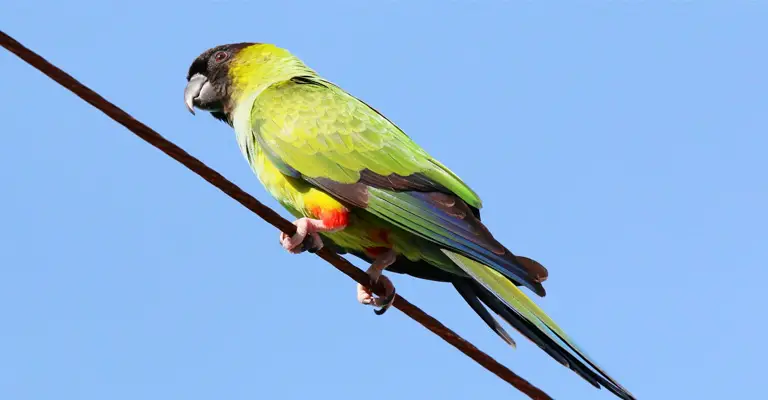
Overview of Nanday Conure Lifespan
The Nanday Conure, scientifically known as Aratinga nenday, is a small to medium-sized parrot species native to South America. These charming and intelligent birds have a relatively long lifespan when compared to other parrot species.
On average, Nanday Conures can live for 20 to 30 years or even longer with proper care and attention to their needs. Their longevity can be attributed to their hardy nature and adaptability, making them popular pets among bird enthusiasts.
To ensure a healthy and fulfilling life for a Nanday Conure, it’s crucial to provide them with a balanced diet, regular exercise, mental stimulation, and regular veterinary check-ups.
Additionally, forming a strong bond with their human caregivers can contribute to their overall well-being and happiness throughout their extended lifespan.
Factors Influencing Nanday Conure’s Lifespan
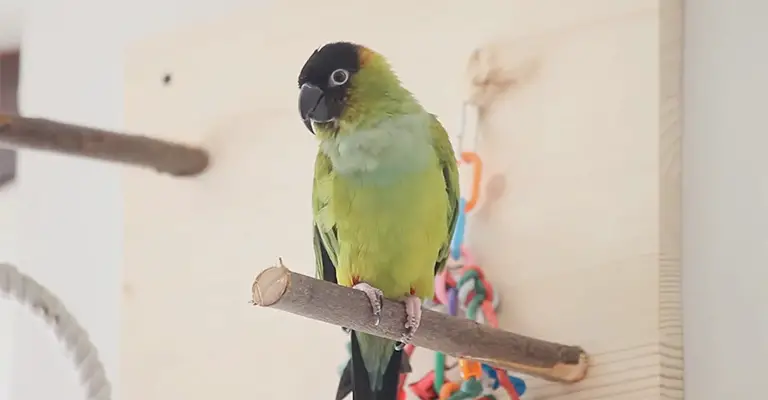
The lifespan of a Nanday Conure, like any parrot species, is influenced by various factors. Here are the key factors that can impact the longevity of these birds:
Diet
Providing a balanced and nutritious diet is critical. A diet rich in fresh fruits, vegetables, high-quality pellets, and a limited amount of seeds helps ensure their overall health and longevity. Avoiding harmful foods and toxins is equally important.
Housing
A safe and spacious enclosure is vital. Nanday Conures need room to move, exercise, and stretch their wings. Proper cage maintenance to prevent exposure to harmful bacteria or mold is also essential.
Social Interaction
These birds are highly social and thrive on interaction with their owners. Loneliness and lack of mental stimulation can lead to stress and health issues. Regular playtime and socialization are crucial.
Exercise
Adequate exercise is necessary to maintain physical health and mental well-being. Providing toys, perches, and opportunities for flight or exploration can help keep them active.
Veterinary Care
Regular check-ups with an avian veterinarian are essential for detecting and addressing health issues early. This includes vaccinations, beak, and nail trims as needed.
Environmental Enrichment
Offering a stimulating environment with toys, puzzles, and activities can prevent boredom and behavioral problems.
Disease Prevention
Nanday Conures are susceptible to certain diseases. Proper hygiene, quarantine measures for new birds, and monitoring for signs of illness are crucial.
Quality of Life
Providing a loving and nurturing environment contributes significantly to Nanday Conure’s well-being and longevity.
Genetics
Genetic factors can play a role in a bird’s lifespan. Some individuals may have genetic predispositions to certain health issues.
Dietary Supplements
In consultation with a veterinarian, supplements like calcium or vitamin D may be necessary to prevent deficiencies.
Toxic Substances
Nanday Conures are sensitive to toxins like lead, zinc, and certain chemicals. Ensuring their environment is free from these hazards is vital.
Stress Reduction
Reducing stressors such as loud noises, sudden changes, or exposure to predators can help maintain their overall health.
By addressing these factors and providing a loving and attentive environment, Nanday Conure owners can help ensure that their birds enjoy a long and healthy life.
Tips to Help Increasing Nanday Conure’s Lifespan
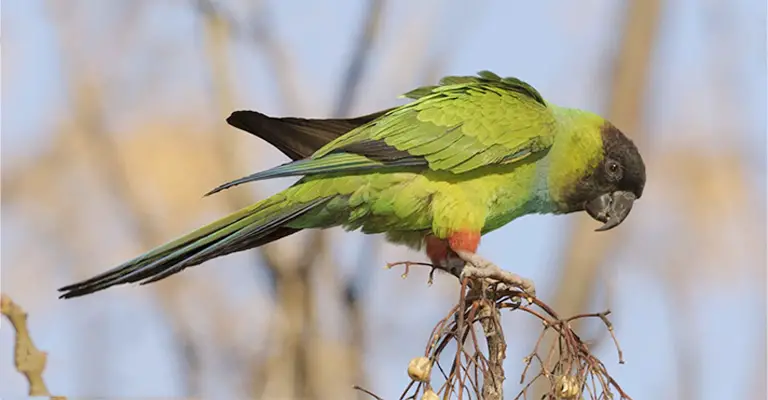
Increasing the lifespan of your Nanday Conure requires a combination of proper care, attention, and a healthy environment. Here are some tips to help ensure your Nanday Conure lives a long and healthy life:
Balanced Diet
Provide a well-balanced diet that includes a variety of fresh fruits, vegetables, high-quality pellets, and a limited amount of seeds. Avoid high-fat and high-sugar foods. Consult with an avian veterinarian for dietary guidance.
Fresh Water
Ensure your bird has access to clean, fresh water at all times. Change the water daily to prevent contamination.
Exercise and Play
Encourage daily exercise and mental stimulation through toys, puzzles, and playtime outside the cage. Nanday Conures are active birds and need opportunities to fly and explore.
Social Interaction
Nanday Conures are social birds and require regular interaction with their owners. Spend quality time with your bird to prevent loneliness and boredom.
Proper Housing
Provide a spacious and safe cage that allows for movement and exercise. Ensure the cage is kept clean to prevent the buildup of harmful bacteria.
Environmental Enrichment
Offer a stimulating environment with a variety of toys, perches, and objects to chew on. Rotate toys regularly to keep your bird engaged.
Regular Vet Check-ups
Schedule regular check-ups with an avian veterinarian. Preventative care can catch health issues early and improve the chances of successful treatment.
Disease Prevention
Follow good hygiene practices to prevent the spread of diseases. Quarantine new birds before introducing them to your Nanday Conure to avoid potential infections.
Safe Environment
Remove or secure any potential hazards in your bird’s environment, such as toxic plants, household chemicals, and items that could be chewed or swallowed.
Limit Stress
Minimize stressful situations for your Nanday Conure. Avoid sudden changes, loud noises, and exposure to potential predators.
Grooming
Regularly trim your bird’s nails and beak if needed. Consult with a veterinarian or an experienced bird groomer for guidance on safe grooming practices.
Fresh Air and Sunlight
Provide access to fresh air and natural sunlight (without direct exposure) to support your bird’s overall well-being.
Emotional Well-being
Pay attention to your bird’s emotional needs. Understand their body language and behavior to ensure they feel secure and happy.
Avoid Obesity
Monitor your bird’s weight to prevent obesity, which can lead to health problems. Adjust their diet and exercise accordingly.
Patience and Training
Be patient and use positive reinforcement when training your Nanday Conure. Training can help with behavior and mental stimulation.
By implementing these tips and providing a loving, nurturing environment, you can significantly increase the chances of your Nanday Conure enjoying a long and fulfilling life.
Diet That Can Help Increasing Nanday Conure’s Lifespan
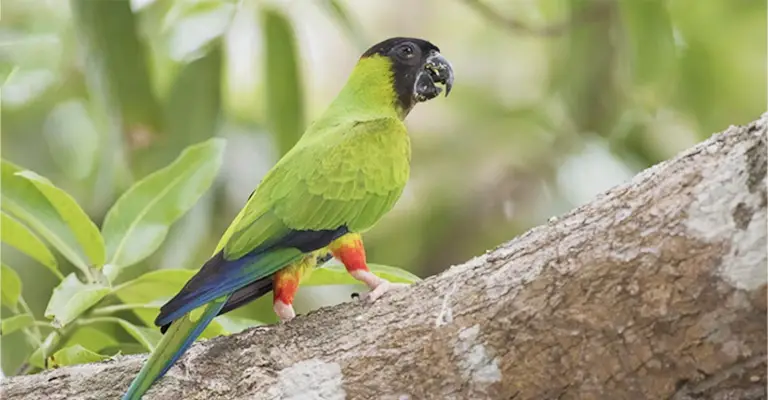
A well-balanced and nutritious diet is crucial for increasing the lifespan of your Nanday Conure. Here’s a diet plan that can help promote their longevity:
High-Quality Pellets
The foundation of your Nanday Conure’s diet should be high-quality commercial pellets specifically formulated for parrots. These pellets provide essential vitamins and minerals. Make sure to choose pellets that are free from artificial additives and preservatives.
Fresh Fruits
Offer a variety of fresh, bird-safe fruits. Good options include apples, oranges, grapes, mangoes, and papayas. These fruits are rich in vitamins and antioxidants.
Fresh Vegetables
Provide a mix of fresh, bird-safe vegetables like carrots, broccoli, spinach, kale, bell peppers, and sweet potatoes. These vegetables offer essential nutrients and fiber.
Leafy Greens
Include leafy greens like kale, collard greens, and Swiss chard in their diet. These greens are high in calcium and other nutrients.
Sprouted Seeds
Sprouted seeds are more nutritious than dry seeds. You can sprout seeds like sunflower and quinoa and offer them as a healthy treat.
Healthy Nuts
Offer small amounts of unsalted, raw nuts such as almonds, walnuts, and Brazil nuts as an occasional treat. Nuts are high in healthy fats and protein.
Cooked Legumes
Cooked legumes like lentils, chickpeas, and beans are excellent sources of protein and can be added to their diet in moderation.
Whole Grains
Include whole grains like brown rice, quinoa, and whole wheat pasta for added fiber and energy.
Protein
Offer lean sources of protein such as cooked chicken or turkey (without seasoning) in small amounts occasionally.
Calcium Sources
Provide sources of calcium, such as cuttlebones or mineral blocks, to support their bone health. Low-fat dairy products like plain yogurt can also be given in small quantities.
Limit Fats and Sugars
Minimize the intake of high-fat and high-sugar foods like seeds and sugary treats. These can lead to obesity and health problems.
Fresh Water
Ensure your Nanday Conure has access to clean, fresh water at all times.
Vitamin Supplements
While a balanced diet should provide most of the necessary nutrients, consult with an avian veterinarian to determine if any specific vitamin or mineral supplements are needed based on your bird’s health and diet.
Remember to wash all fruits and vegetables thoroughly to remove pesticides and chemicals before offering them to your Nanday Conure. Additionally, monitor your bird’s weight and adjust their diet as needed to maintain a healthy body condition.
Healthcare and Regular Check-ups
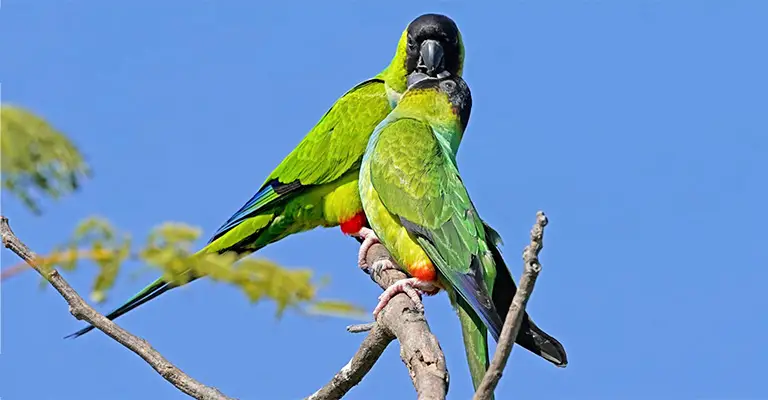
Healthcare and regular check-ups are essential for ensuring the well-being and longevity of your Nanday Conure. Here’s a guide on how to take care of your bird’s health:
Find an Avian Veterinarian
Locate a qualified avian veterinarian with experience in treating birds, especially parrots. Regular check-ups and timely medical attention are crucial for maintaining your bird’s health.
Initial Health Check
When you first acquire your Nanday Conure, schedule an initial health check with the veterinarian. This helps establish a baseline for your bird’s health.
Regular Check-ups
Schedule regular veterinary check-ups, typically at least once a year. During these visits, your vet will examine your bird, check for signs of illness, and provide guidance on nutrition and care.
Vaccinations
Discuss with your vet whether your Nanday Conure requires vaccinations based on their health and risk factors.
Fecal Tests
Regular fecal tests can help identify internal parasites or other health issues. Your vet may recommend periodic fecal examinations.
Beak and Nail Trims
Your bird’s beak and nails may need occasional trimming to prevent overgrowth. This is typically done during vet visits or by an experienced groomer.
Wing Clipping
If necessary, discuss wing clipping with your veterinarian to ensure it is done correctly and safely.
Dental Care
Dental issues can affect birds. Your vet can check your Nanday Conure’s oral health during check-ups.
Nutritional Guidance
Consult your vet for dietary recommendations specific to your bird’s age, health, and nutritional needs. Ensure your bird receives a well-balanced diet.
Emergency Car
Know your avian vet’s emergency contact information. Birds can deteriorate quickly when they’re unwell, so it’s essential to have a plan for emergencies.
Behavioral Changes
Monitor your bird’s behavior closely. Any sudden or significant behavioral changes, such as lethargy, loss of appetite, or changes in vocalization, could indicate health issues.
Quarantine New Birds
If you introduce new birds into your household, quarantine them for a period recommended by your vet to prevent the spread of diseases.
Parasite Prevention
Discuss parasite prevention strategies with your vet and follow their recommendations.
Cage Hygiene
Maintain a clean cage to prevent the buildup of bacteria and mold. Regularly clean and disinfect your bird’s cage and accessories.
Stress Reduction
Minimize stressors in your bird’s environment, such as loud noises or sudden changes, as stress can weaken their immune system.
Record-Keeping
Keep a health record for your Nanday Conure, noting any vet visits, vaccinations, medications, and changes in behavior or health.
Social and Mental Stimulation
Provide mental and social stimulation to keep your bird mentally and emotionally healthy.
Regular veterinary care and proactive health management are essential for ensuring your Nanday Conure enjoys a long and healthy life.
FAQs
The average lifespan of a Nanday Conure is around 20 to 30 years, with some individuals living even longer when provided with proper care, a balanced diet, and a stimulating environment.
You can increase your Nanday Conure’s lifespan by offering a nutritious diet, regular exercise, mental stimulation, social interaction, and ensuring a safe and stress-free environment. Regular veterinary check-ups are also essential for early disease detection.
Nanday Conures may be prone to respiratory infections, psittacine beak and feather disease, and obesity. Regular veterinary care, a clean living environment, and a balanced diet can help prevent and manage these issues.
Yes, a diet rich in fresh fruits, vegetables, high-quality pellets, and limited seeds is crucial. Avoid high-fat and high-sugar foods, as obesity can shorten their lifespan. Consult with a veterinarian for personalized dietary guidance.
It’s recommended to schedule annual check-ups with an avian veterinarian for your Nanday Conure. Regular veterinary care helps monitor their health and detect potential issues early, contributing to a longer and healthier life.
Wrapping Up
In the journey of sharing our lives with Nanday Conures, understanding the factors that influence their lifespan is the first step towards offering them a rich and fulfilling existence.
By providing a balanced diet, regular veterinary care, ample mental and physical stimulation, and a safe and loving environment, you can play a significant role in extending the lifespan of your Nanday Conure.
With the knowledge and dedication outlined in this guide, you’ll not only enhance your bird’s longevity but also forge a deeper bond with your feathered friend.
So, embark on this rewarding journey of avian companionship, armed with the insights needed to ensure a long and joyful life for your Nanday Conure. Best wishes.